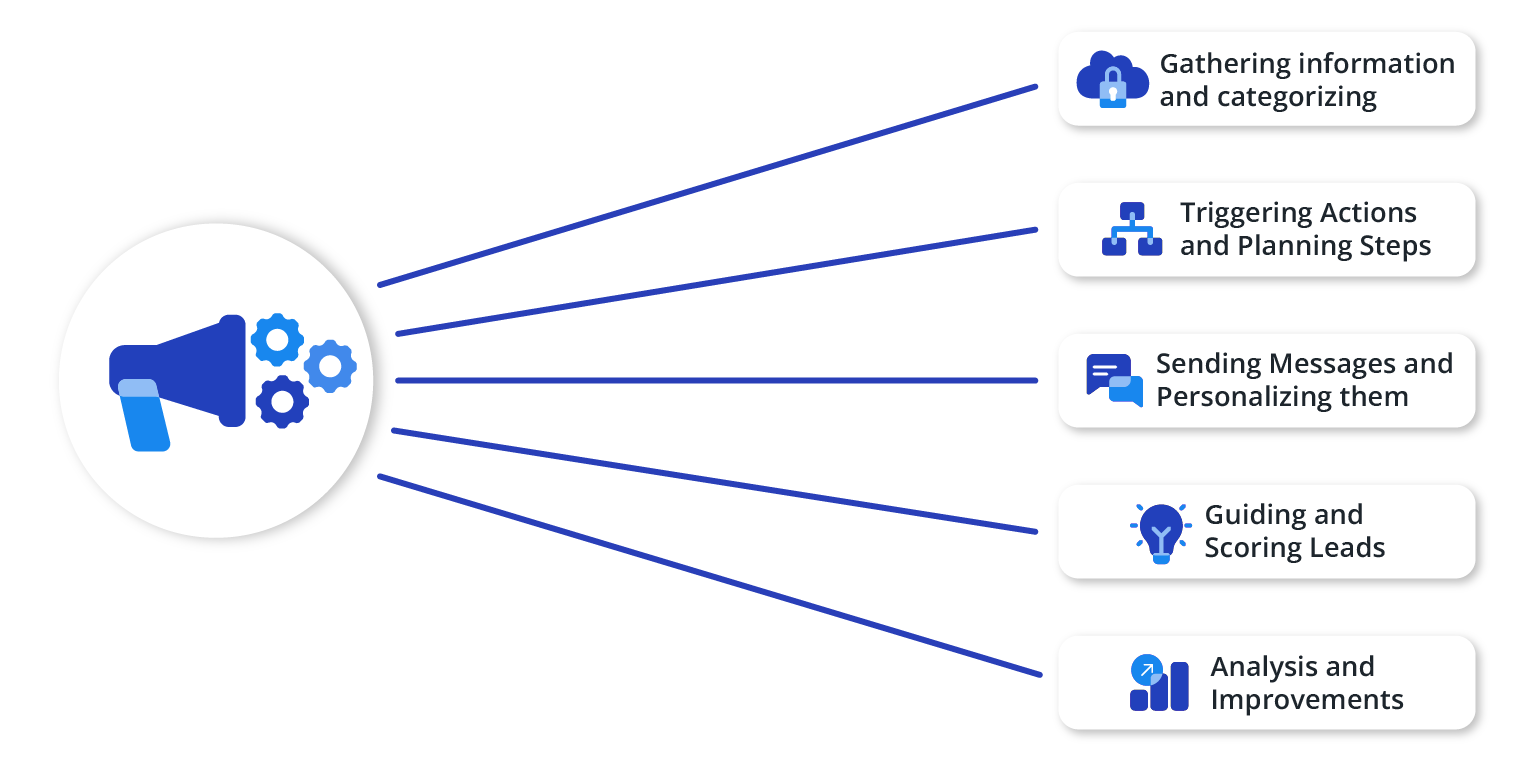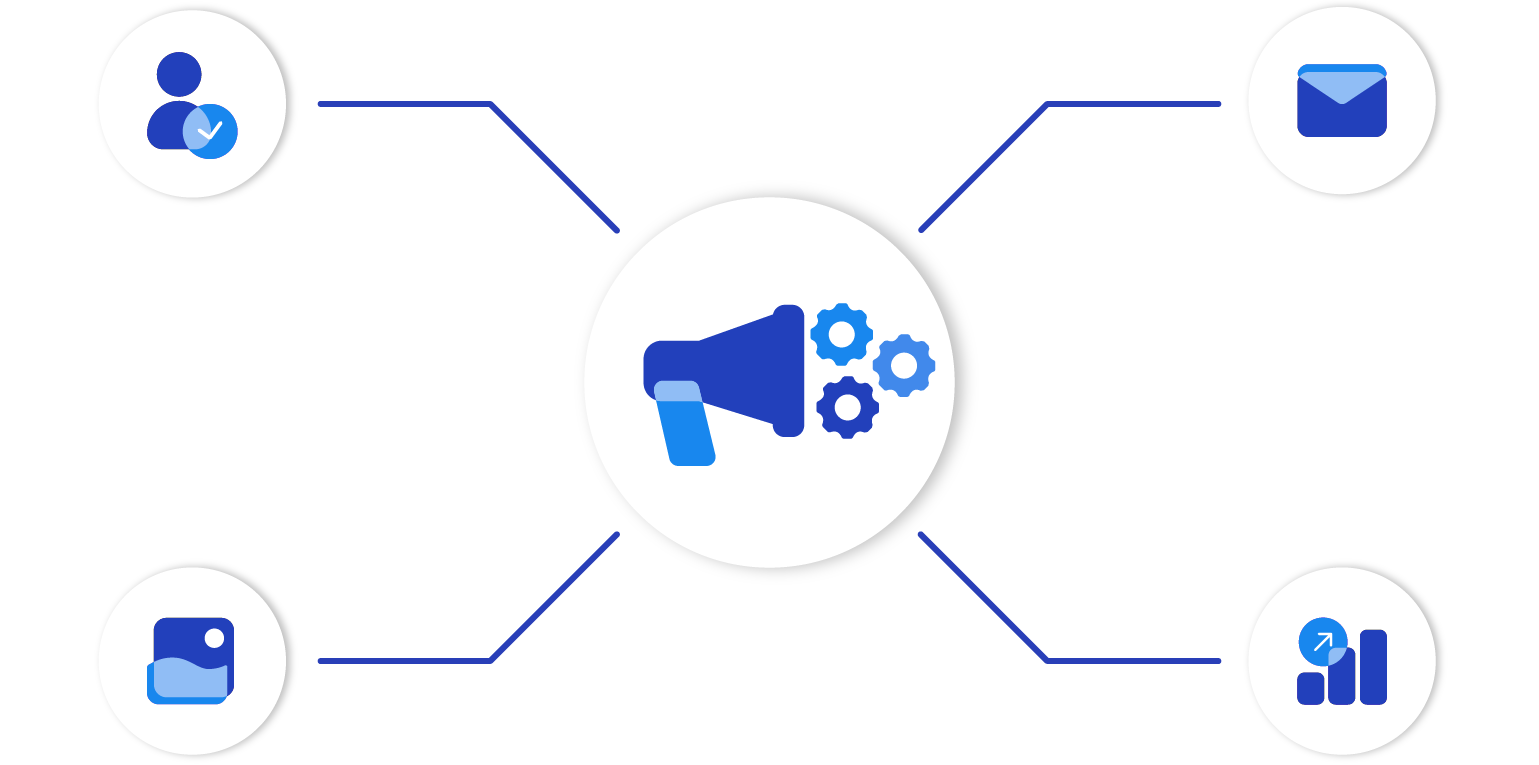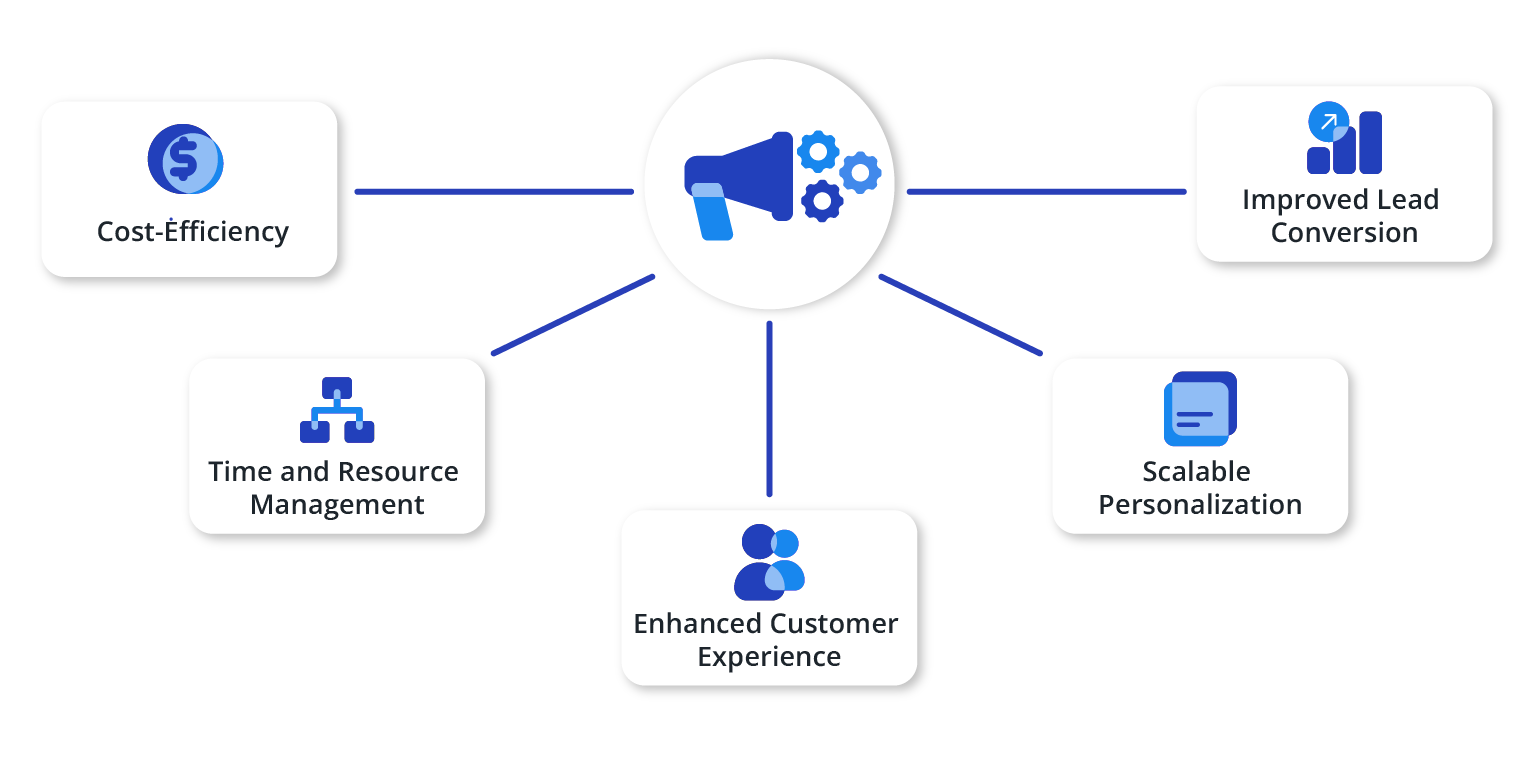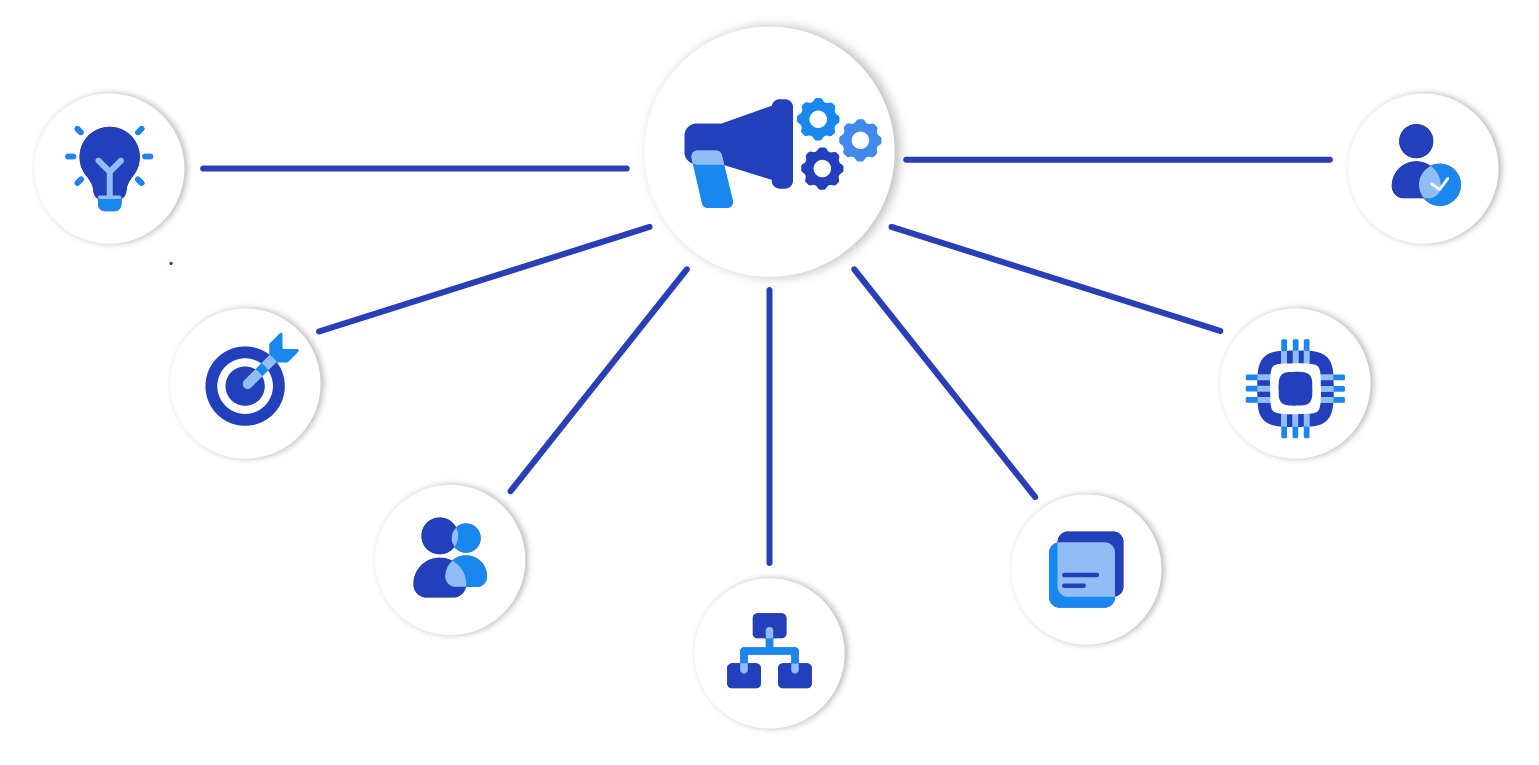As many top businesses can attest, marketing automation is the secret behind skyrocketing revenues and unmatched customer loyalty. It offers an opportunity to boost efficiency, cut costs, and enhance customer experience.
Taking the leap into automation may seem intimidating, but with the right guidance, the journey becomes easy.
Join us as we explore the essentials of marketing automation and its potential to supercharge your brand’s impact.
What Is Marketing Automation?
Marketing automation is a powerful digital tool designed for businesses to streamline and optimize their marketing activities across various channels.
In the late 1990s, marketers struggled with manual tasks like sending individual emails and using complex spreadsheets. But with the internet boom in the 2000s, the foundation for automation began. The goal was simple: remove repetitive tasks and focus on creative strategy and genuine relationship-building.
These early attempts to combine technology with marketing made email campaigns and lead tracking easier. This leads to better efficiency, greater ROI, and improved customer experience. Naturally, the demand for advanced platforms grew.
Fast-forward to today, marketing automation isn’t just about emails. It’s about personalizing customer experiences, analyzing complex data, and fine-tuning strategies for maximum engagement. It’s a fundamental tool in effective marketing, blending tech innovation with strategic creativity.
How Does Marketing Automation Work?
Understanding the mechanisms behind marketing automation can give your team a competitive edge.
At its foundation lies the crucial phase of gathering information and categorizing. Automation tools are like digital detectives, meticulously collecting data from user interactions, form submissions, and even web cookies. This data isn’t just numbers and figures; it reveals your audience’s preferences, behaviors, and tendencies.
Then comes triggering actions and planning steps. When a user, for example, downloads an e-book, it can initiate actions like sending a related email or newsletter. This ensures relevant and timely interactions.
Then, there’s the task of sending messages and personalizing them. Today, personal touch matters. It’s more than just calling a user by their name; it’s delivering content tailored to their interests and needs.
A critical aspect is guiding and scoring leads. By scoring leads based on activity, businesses can identify those ready for conversion and focus on the most promising ones.
Lastly, analysis and improvements complete the process. No strategy is set in stone. The beauty of marketing automation lies in its ability to constantly learn and adapt.
By analyzing campaign performance and user feedback, businesses can refine their strategies. It’s an ongoing cycle of improvement, ensuring your marketing campaigns remain agile and effective.
In essence, marketing automation streamlines engagement, ensuring every touchpoint with your audience is relevant, timely, and impactful.
Key Features of Modern Marketing Automation Tools
Modern marketing automation tools have become the key to successful campaigns. They offer a wide range of specialized features to meet the diverse needs of today’s businesses. Let’s explore some pivotal ones:
Lead Scoring and Management
Think of this as a digital sieve. It doesn’t just gather leads but ranks their value. By assigning scores, these tools highlight the leads with the highest potential, allowing sales and marketing teams to target their best prospects.
Email Campaign Automation
Efficiency meets personalization here. Automated email campaigns send customized messages to inboxes round-the-clock. It’s an easy way to engage large audiences without sacrificing personal touch.
Social Media Integration
Today, social media isn’t just another platform—it’s the pulse of the online world. By connecting it with automation tools, businesses can unify their strategies, keep messaging consistent, and gain insights from real-time interactions.
Analytics and Reporting
Action without reflection is aimless. These tools provide businesses with a clear view of the results of their marketing efforts. With data at their fingertips, brands can continually refine their strategies, ensuring each campaign is better than the last.
While this overview highlights some vital features, the world of marketing automation is vast. The tools are constantly evolving, offering new capabilities. This list isn’t exhaustive but gives an idea of what these tools offer and their importance in modern marketing.
Benefits and Pitfalls of Marketing Automation
Marketing automation tools offer tons of benefits, transforming business operations and customer engagements. However, like any powerful tool, it comes with challenges. By knowing the benefits and potential pitfalls, businesses can use these tools effectively, maximizing gains and minimizing setbacks.
Benefits
Marketing automation can revolutionize operations, making processes more efficient and outcomes more effective.
Cost-Efficiency
Every penny counts in business. Automation helps cut costs by ensuring that efforts aren’t duplicated, and resources aren’t wasted, resulting in better ROI.
Time and Resource Management
With automation handling routine tasks, teams can redirect their focus toward strategic planning, innovation, and creativity, maximizing productivity.
Enhanced Customer Experience
In marketing, timing is everything. Automation ensures customers receive the right content when they need it, improving satisfaction and loyalty.
Scalable Personalization
Before automation, personalizing content for a vast audience was a Herculean task. Now, businesses can effortlessly tailor experiences for each user, increasing relevance and engagement.
Improved Lead Conversion
Automation tools help accurately target leads with the highest potential, significantly boosting conversion rates.
Pitfalls
Despite its numerous advantages, it’s essential to approach marketing automation with caution, being mindful of potential pitfalls.
Misaligned Timing
A minor error, like scheduling a promotional email for the middle of the night, can diminish the campaign’s impact.
Loss of Authenticity
Over-reliance on automation can make interactions feel generic, devoid of the human touch customers often crave.
Assuming All Leads Are Ready
Automation can sometimes be over-eager. Bombarding a lead with information before they’re ready can be off-putting, potentially jeopardizing future engagement.
Risk of Overcommunication
Flooding customers with too many messages might not just be ignored but can also lead to frustration and disengagement.
While marketing automation offers a wealth of opportunities, it’s essential to balance enthusiasm with prudence. By using its strengths and dealing with its challenges wisely, businesses can achieve sustained growth and success.
Marketing Automation Examples
Marketing automation’s impact isn’t theoretical; it’s seen in how some of the world’s biggest brands enhance user experience and drive conversions. Let’s explore some stellar examples of its power.
Netflix
More than just a streaming giant, Netflix is an expert in data analytics. Behind the scenes, its algorithms are complex at work, analyzing your viewing patterns, genres you favor, and even the times you’re most active.
This meticulous analysis ensures that when you log in, you’re greeted with movie and series recommendations that resonate with your taste. It’s not just about keeping viewers engaged; it’s about offering content that feels custom-picked, enhancing user satisfaction and loyalty.
AirBnB
AirBnB uses automation to make hosting and traveling seamless. For hosts, it gives tips on local demand and pricing to help maximize bookings. For travelers, it suggests stays based on their preferences to make finding the perfect holiday home easier.
Amazon
E-commerce behemoth Amazon has masterfully woven marketing automation into its platform.
Beyond the iconic “Customers who bought this also bought” feature, it sends wish-list reminders, restock notifications, and even personalized discounts based on what customers view, abandon in carts, or frequently purchase. This way, Amazon crafts a shopping experience that feels both expansive and deeply personal.
Marketing Automation Best Practices
In marketing, automation can be immensely powerful but potentially harmful if misused. For organizations wanting to harness its full potential, a set of best practices can be your guide.
Know Your Audience
Every interaction starts with understanding. Know your audience’s demographics, behaviors, preferences, and pain points. The more you know them, the better your campaigns will resonate. It’s not just about sending messages but also ensuring those messages strike a chord.
Set Clear Goals
Automation without direction is like sailing without a compass. Whether it’s increasing lead conversions, improving customer engagement, or driving sales, have a clear, measurable objective. This ensures efficiency and helps in evaluating success.
Collaborate Across Teams
Marketing automation is most effective when it’s a team effort. Collaboration between marketing, sales, and support teams creates comprehensive campaigns that cover all customer touchpoints. Share insights, align objectives, and see the results.
Automate Wisely
The appeal of automation can be tempting, but refrain from over-automating. Ask the fundamental question: “Does this process automation add value?” If not, it’s best to keep the human touch intact.
Employ A/B Testing
Today, decisions should be driven by data. Use A/B tests to determine which campaigns, subject lines, or call-to-actions resonate best. This approach refines strategies and ensures optimal outcomes.
Select the Right Tool
The market is flooded with marketing automation platforms. Instead of going with the most popular or the cheapest, assess what aligns best with your business needs, scales with your growth, and integrates smoothly with existing systems.
Prioritize Customer Experience
At the heart of every marketing effort is the customer. Every automated process, campaign, or interaction should aim to improve their experience. A delighted customer isn’t just loyal; they promote the brand.
In essence, good marketing automation skillfully combines technology with a personal touch, always keeping the customer at the core of every action.
Marketing Automation: Best Tools & Software
Considering the plethora of marketing automation tools available, here are the top picks for enterprises in 2023:
Kizen
Kizen distinguishes itself as a trailblazer in the marketing automation landscape, driven by our unparalleled ability to build, connect, and deploy custom enterprise neural networks, ensuring complete integration of critical technologies and data.
This unique ability enables unprecedented levels of automation and collaboration across teams, ensuring optimal ROI from technology investments.
What sets Kizen further apart is our quick deployment capabilities. While competitors may take months to deliver value, Kizen promises tangible results in weeks and full implementation in less than six months, even in the most complex industries.
This agility comes from our revolutionary modular infrastructure and no-code drag & drop tools. Not only does this infrastructure allow us to adeptly manage today’s data volume and complexity, but it also positions businesses to adapt to future tech changes easily.
Kizen isn’t just an automation tool; it’s a commitment to a new era of technological excellence.
HubSpot
Mainly focusing on inbound marketing, HubSpot offers a range of tools designed to manage and automate various aspects of the marketing funnel. From capturing leads to analyzing results, it simplifies organizing and executing campaigns. Its interface is known for its straightforward nature, enabling users to implement tasks without steep learning curves.
Salesforce
Originally known for customer relationship management (CRM), Salesforce now includes marketing automation under its Salesforce Marketing Cloud branch. This platform enables businesses to manage customer journeys, run email campaigns, and segment audiences.
One of its standout features is its integration capability, which allows for a unified view of a customer, bridging the gap between sales and marketing efforts.
Marketing Automation and CRM
Marketing automation and customer relationship management (CRM) form a crucial duo in the business world. While marketing automation draws potential leads with targeted campaigns, CRM nurtures these leads, leading them to conversion. Together, they create a continuous feedback loop, refining strategies based on customer interactions.
A seamless integration of these systems guarantees maximum ROI. Leads move smoothly from attraction to conversion, and every interaction is used to improve future strategies.
However, if these systems don’t work well together, it can be costly. Leads can fall through the cracks, and potential sales might be lost due to miscommunication or lack of follow-up. Moreover, inconsistent data between the two systems can lead to misguided marketing efforts and inefficient resource allocation.
Yet when these systems effectively communicate, the benefits are huge.
Organizations can anticipate the needs of their customers, creating hyper-targeted marketing campaigns. Sales teams are equipped with valuable customer insights, enabling them to customize their approach for higher conversion rates. And the feedback loop continues, with each successful conversion feeding more data back into the marketing strategy.
Thus, the relationship between marketing automation and CRM is more than just complementary. It’s a dynamic partnership where the success of one amplifies the effectiveness of the other.
Get Started With Marketing Automation
Embracing marketing automation is a game-changing decision for businesses, and its benefits are manifold. With tools like Kizen, you can create personalized customer experiences, streamline operations, and make data-driven decisions.
By integrating marketing automation into your strategy, you’re not just investing in a tool but committing to a future of increased customer loyalty, higher conversion rates, and more significant ROI.
Ready to amplify your marketing? Experience the Kizen difference and propel your business forward. Contact us today to start your journey.
Additional References
https://www.youtube.com/watch?v=G6c4-28FsAs












